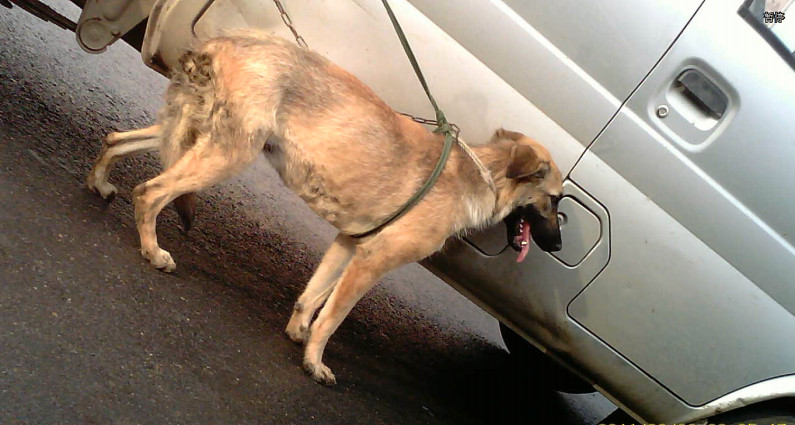Now, a proposed law to end cat and dog meat eating is being backed by millions of Chinese who are tired of the cruelty and criminality of the trade.
The ground-breaking legislative proposal is the work and creation of Zheng Xiaohe, a 52-year-old deputy to the National People’s Congress.
In his request to outlaw the dog and cat meat industry once and for all, he concludes:
“Please ban cat and dog meat from entering food and catering markets as well as for use in food processing materials. Please ban the transport, trade, slaughter, manufacture and sales of cats and dogs for the purpose of eating.”
It’s a sentiment that has hit home with most of the Chinese. Given the chance to give their views on potential policy they have officially voted online in their millions. Currently those backing the ban stands at a whopping 8.6 million – by far the most popular of an array of current proposals.
The accompanying document features a lengthy outline of the many issues which surround the trade. They follow the topics covered in last year’s widely available cat and dog meat trade reports which were compiled by Animals Asia.
He cites:
1. A threat to security and social order
The burglaries, vigilantes, devastated old and even handicapped people who lose much loved companions. China’s media continues to highlight the violence and heartbreak surrounding the trade. The vast majority of dogs are stolen not farmed and the result is all manner of criminality.
2. Fear of epidemics
The transportation of thousands of non-quarantined domestic and stray cats and dogs is a ticking time bomb for China. A rabies epidemic is a major fear but with SARS and H7N9 still fresh in the memory, it’s not a risk worth taking.
3. A “dark industry with dangerous food safety”
Echoing Animals Asia’s research from last year the proposal outlines that the vast majority of dogs are not farmed, instead they are stolen companions. Not only does that mean heartache for owners it also means animals are untraceable and the act of catching them means they are often poisoned – another food safety risk.
4. No controls mean banning is the only solution
Food safety is a big issue in China but to-date the cat and dog meat trade has managed to hide from regulation. No regulation on how dogs and cats are slaughtered has meant trucks of often sick, diseased and even poisoned dogs or cats have not been quarantined. Multiple times during the course of investigations, Animals Asia personnel have seen dogs and cats already dead in their suffocating wire transport cages.
The report calls it:
“..a clear violation of the purpose and mission of China’s Food Safety Law and Animal Epidemic Prevention Law.”
In addition, general confusion surrounding the trade and what laws must be adhered to means grey areas and greater opportunities for crime.
For Animals Asia staff, bringing these issues into wider public consciousness has been their longterm aim.
In June of 2015, Animals Asia released four in-depth investigative reports about China’s dog meat industry. This series of investigations lasted for a period of four years and exposed a great number of illegal operations inside the dog meat industry. The Weibo (China’s most popular social media platform) post for the first report reached over 84 million people, and had more than 12,000 shares and 2,000 comments. The reports were shared by more than 60 newspapers and magazines in China, and were delivered to more than 30 government departments
Animals Asia Cat and Dog Welfare Director Irene Feng stated:
“It wasn’t so long ago that no-one questioned where their food came from – least of all meat from dogs and cats. Now food safety is a big issue in China and, at the same time, we are seeing rising interest in animal welfare, particularly in reference to companion animals.
“First people didn’t think about the source of this meat. Then they were told it was farmed. Now they know it’s stolen – potentially even poisoned – and the ‘collection’ is responsible for not just great sadness but also burglary, violence and murder. We know that we have huge support in China to end cat and dog meat eating. Almost nine million votes here show how widespread that is.”
While the legislative proposal has no accepted route to becoming an actual law – it’s hoped the government will acknowledge it and, as a barometer of current concern, become aware that ending the trade would be a popular move.
Animals Asia founder Jill Robinson went on to add:
“If laws can’t be changed to benefit animals alone then this proposal is clear – the dog and cat meat trade is not good for the country. The authorities are aware that grieving animal lovers are taking matters into their own hands and are determined to expose the harsh realities of the dog and cat meat trade.
“There’s no regulating this trade and there would be no-one going hungry if dog and cat meat eating ended tomorrow. Cats and dogs are not eaten due to a lack of food or money, they are eaten mainly during festivals, and special events. There’s no reason to save the trade. There’s nothing worth saving as the trade relies on crime, not to mention the broken hearts of those who have lost beloved companions.”
Dog meat eating in China has shot up to international prominence – largely due to the Yulin dog meat festival that takes places every year during the summer solstice in June. In the past, media reports have cited that over 10,000 dogs were slaughtered within two days. That number has diminished due to much local and international pressure. Last year it was reported to be less than 1,000.
In addition, while this was originally seen as a way to promote Yulin and the region of Guangxi, local authorities more recently seem to have distanced themselves from the event.
Animals Asia Cat and Dog Welfare Manager Carrot Chen stated
“This is a round-the-year mission for us. It’s estimated that over 10 million dogs are eaten each year in China. The publicity surrounding Yulin has helped raise awareness of that worldwide. We must stop the festival but we also must stop all eating of dogs and cats. The inherent cruelty of dogs being stolen, transported thousands of miles and then caged and slaughtered in the cruellest way – is not something that should still be happening in modern China. It needs to end and we are confident that it will.”













